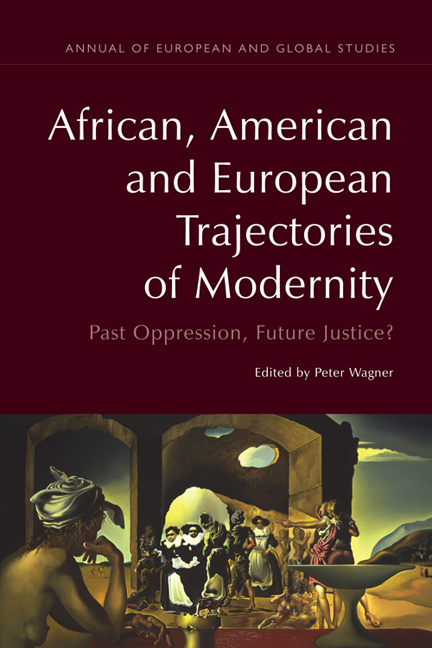Introduction
Published online by Cambridge University Press: 05 August 2016
Summary
THIS SECOND VOLUME of the Annual of European and Global Studies addresses two central concerns of the field: First, it contributes to the recent efforts of linking the history of Europe more firmly to world history or, in a different terminology, of situating European modernity in global context (for examples of the former, see Baily, 2004; Osterhammel, 2008; for the latter, Delanty, 2013). It does so by detailed studies of the linkages between Africa, America and Europe, showing that what is often referred to as ‘the rise of Europe’ is better understood as the creation of an Atlantic world region with increasingly dense but highly asymmetric commercial and communicative ties. Economically speaking, the result was the systematic employment, underpinned by violence, of African labour and American soil for bringing about what has become known as the Industrial Revolution in Europe. In cultural–intellectual terms, elites in Africa and America came increasingly to look up and ahead to Europe as the source for viable directions in which to develop their own societies, all the while considering the particularities of their situation in relation to the apparent European ‘model’. Thus, one of the key concerns of this volume is a better understanding of why, from some moment onwards, ‘Europe’ and ‘the rest of the world’ entered into a particular relation, not merely one of domination by the former over the latter but one that was conceived as a kind of superiority, often more specifically as an ‘advance’ in historical time.
This alleged particular position of Europe has underpinned the historical and sociological debate over modernity for the last 150 years, often conflating a particular history with the– analytical and normative– theorisation of society and politics. Reviewing the history of the relations between Africa, America and Europe, thus, secondly, invites one to reflect anew on the concept of modernity. Starting out from the asymmetric economic relations and the orientation of cultural– intellectual life towards a Europe that seemed to be ‘ahead’, our reflections here centre on the temporality of modernity, on the question of how far the supposed arrival of modernity in one place, Europe, alters the ways in which human beings situate themselves in time and history worldwide. Analytically speaking, this is the question about a direction of history which was central to philosophies of history up to the nineteenth century.
- Type
- Chapter
- Information
- African, American and European Trajectories of ModernityPast Oppression, Future Justice?, pp. 1 - 18Publisher: Edinburgh University PressPrint publication year: 2015



